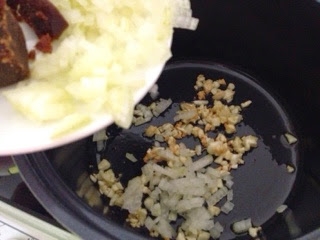Steamed satay chicken bun is a slightly sweet and spicy version of the popular char siew or Chinese BBQ pork bun. I love eating satay with some fresh cucumber, so I added some to make a more balance flavour. Accompanied with the soft and sweet steamed bun, the sweet and spicy satay chicken filling make a good snack or filling meal :)
Yield: 16 x 8cm bun
Satay Chicken Filling
Ingredients
2 boneless chicken leg, about 380g
1/2 tsp salt
1 tbsp coriander powder
1 tsp pepper powder
Direction
1. Rinse and remove chicken skin. Cut chicken into small cubes.
2. Marinate the meat with salt, coriander powder and pepper powder. Set aside.
Satay gravy
2 tbsp onion, chopped
3 cloves garlic, chopped
1~2 tsp Mee Siam or sambal chilli paste
40g coarsely ground peanut
1/2 tsp sweet soy sauce
40g palm sugar
1/4 tsp salt
30g water
Starch water
(1 tsp corn starch mix with 1 tbsp water)
Juice from 1~2 limes
1/2 tsp coriander leaf, chopped
1 tbsp japanese cucumber, shredded
Direction
1. Cut cucumber into thin strips. Marinate with 1/8 tsp salt to drain the juice out.
2. Use a paper kitchen towel to pat dry the cucumber stripes. Set aside.
3. Heat 1 tbsp olive oil in the pot. Add in garlic and stir fry till fragrant, then add in onion.
4. When the onion has softened, add in palm sugar to melt.
5. Add in the mee Siam or sambal chilli paste.
6. Stir in the sweet soy sauce, ground peanut powder and water.
7. When the mixture starts to boil. Pour in the starch water and mix well.
8. Transfer the peanut gravy to a clean bowl and squeeze in the lime juice.
9. Mix well and rest aside to cool down.
10. After the peanut gravy has cooled down, pour to mix with the marinated chicken and cucumber strips.
11. Cover with a lid, set aside till needed.
Sweet Bun Dough
The Sponge
Ingredients
80g HongKong flour 包粉/香港低筋面粉
1 tsp instant dry yeast 即发干酵母
70g water 水
Direction
1. Mix flour and instant dry yeast in a mixing bowl.
2. Slowly add in the 70g of water, stir in one direction till it form into a paste.
3. Cover and let the dough proof for 50 minutes.
The Dough
Ingredients
Sponge from above
250g Hongkong flour 包粉/香港低筋面粉
50g confectioner's sugar 糖粉
1/2 tsp double acting baking powder 双重发粉
1/8 tsp salt 盐
20g rice bran/corn oil 米糠油/玉米油
70~90g water, add as required 水,水量自酌
Direction
1. Mix HongKong flour, confectioner's sugar, salt and double acting baking powder by using a hand whisk.
2. Pour the remaining ingredients, except the water, into the mixture in (1).
3. Slowly add in the water and stir at the same time, till you get all the ingredients into a big lump.
Leaving behind about 20g of water to be added depending on the consistency of the dough.
Avoid adding too much water to the dough, to help the buns keep its shape after steaming.
4. Transfer the dough onto a floured work top and knead into an elastic and smooth dough.
5. Flatten the dough and divide into 16 portions, each about 37g. Roll into balls, coated with flour, and place in a mixing bowl.
6. Roll out the dough into a flat dough with the edge thinner than the center. Flip the dough skin over, so that the smoother side will be facing out when wrapped.
Scoop a spoonful of satay chicken filling onto the center of the dough skin. Wrap up the dough,pleats several folds, and sealed the opening.
Place the bun dough onto a piece of paper. The paper helps you to carry the buns into the steamer later.
7. Proof the buns for 20 minutes before steaming.
Start counting down the proofing time, the minute you finish shaping the first buns. If you only start to count down the proofing time after finish shaping the last buns, the first bun would be over-proofed.
Start heating a pot of water for steaming the buns, when you start shaping the buns.
8. When the water boils, steam the buns for 5 minutes under medium high flame.
Turn down flame to medium and continue to steam for about 2 minutes. After 2 minutes, open the lid slightly for 1 minute.
9. Transfer the buns to a cooling rack.
Keep the unconsumed buns in the fridge for overnight storage.








































This comment has been removed by a blog administrator.
ReplyDeleteI enjoyed this back in the mid 1960's when I was helping a Chinese woman to speak English and learn how to drive. I'm excited to have found this recipe and can hardly wait to see if I can make these delicious steamed rolls. Thank you!
ReplyDeleteHi Marina, thank you for sharing your love and encounter with this steamed roll decades ago. Hope you’ll have fun trying it out 😊
Delete